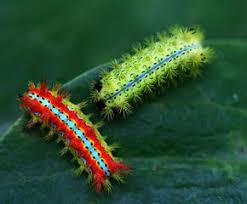Ben Van Allen collects caterpillars. While doing postdoctoral research at Louisiana State University, Van Allen saw that some of the caterpillars were having others for lunch.
本·范·阿伦喜欢收集毛毛虫。在路易斯安那州立大学做博士后研究时,范·阿伦看到一些毛毛虫会把同类当午餐吃掉。
Rather than cry over his losses, Van Allen took advantage of the cannibalism for his research.
他并没有因毛虫的减少而伤心,而是利用这种同类相食的现象来进行科学研究。
"Generally speaking, it's nutritious to eat the same species, because they have all the nutrients that are already inside you, so it's an easy-to-process meal."
“一般来说,吃同类是很有营养的,因为它们含有你体内的所有营养元素,因而可以说它们是利于消化吸收的食物。”

"It also reduces the amount of competition you are going to experience – it's just one fewer individual trying to eat the same food you are, in the same area. And it's usually easy to find members of the same species too, since they live in the same place you do."
“这种行为也会为你减少竞争对手--毕竟吃掉一个同类就意味着少了一个在同一地区和你争抢同一种食物的对手。而且由于大家都生活在同一个地方,所以通常也很容易看到同类。”
Van Allen and colleagues collected the caterpillars to study disease transmission in lepidoptera -- moths and butterflies.
范·阿伦和他的同事们收集了这种毛毛虫,来研究鳞翅类物种(蛾类和蝴蝶)的疾病传播。
After observing the cannibalism they wondered if their subjects' appetite for each other might be dangerous for the individual -- if it ate an infected cousin -- but benefit the group -- by removing the infected individual from the population.
在对这种会同类相食的物种进行了观察之后,他们对这种嗜食同类的喜好是否会对个体有危害感到很好奇--假设一个个体吃掉了一个患有传染病的同类,但这对种群来说则是有益的--因为它将传染者从群体中消灭了。
"Our main point is that, while that is an individually risky thing for a cannibal, as populations are more cannibalistic, they actually prevent diseases from getting into the population in the first place."
“我们的主要观点是,尽管这对个体来说是件冒险的事,但由于这类生物更加倾向于同类相食,这实际上从一开始就预防了传染病进入该种群。”
Van Allen's study is in the journal American Naturalist.
范·阿伦的这项研究发表在了《美国自然主义者》杂志上。












